When considering purchasing a bathtub for your bathroom, starting with its material is a good approach. The material not only affects the bathtub's durability, appearance, and feel but also significantly impacts its price. In this article, Giving Tree Home will guide you through a comparison of the 4 most common bathtub materials, analyzing their respective pros and cons to help you find the perfect design solution for your bathroom!
Common Bathtub Materials

Cheapest Bathtub Material
Fiberglass
Fiberglass is a composite material made of fine glass fibers typically combined with resins like polyester or epoxy to create a strong, lightweight structure. As a common bathtub material, it can be used for casting freestanding, built-in, or shower-tub combinations. Its most significant advantage is its affordability, both in terms of unit price and reduced installation costs. On platforms like Amazon, fiberglass bathtubs can be priced at under $500, making it undoubtedly the most cost-effective bathtub material available.
-
Pros
- Affordable making it an ideal choice for families on a budget.
- Lightweight makes it easy to transport and install, which facilitates use upstairs or in spaces that require special installation.
- Simple Craftsmanship can be molded into various styles and designs.
-
Cons
- When moisture is present in the fiberglass insulation, mold can develop.
- More prone to scratches or impact damage compared to other bathtub materials.
- May experience color fading after prolonged use, typically around 5 years.
- Fiberglass bathtubs have lower insulation performance due to their higher thermal conductivity.

Healthiest Bathtub Material
Acrylic
Acrylic is a synthetic plastic made from polymethyl methacrylate (PMMA), which is produced through the polymerization of methyl methacrylate monomer (MMA) with a catalyst. As a polymer material, acrylic does not release harmful substances under normal use conditions. Its smooth, non-porous surface makes it difficult for bacteria and mold to adhere and proliferate. Therefore, it is widely considered one of the healthiest bathtub materials available.
-
Pros
- Wide availability so comes in a variety of styles and sizes, providing more options for consumers.
- Its non-porous surface reduces the growth of bacteria, minimizing maintenance costs.
- Generally priced under $1,000, it is the second most affordable option after fiberglass.
- The hollow structure makes it lighter and provides an additional insulating layer, enhancing the bathtub’s heat retention.
-
Cons
- Some users may find its lifespan relatively short, usually around 10 years.
- It has a warmer plastic feel, which some users may perceive as inferior.
-
Mokleba 47'' Acrylic Small Freestanding Tub Modern Japanese Soaking Bathtub

 Mokleba 47'' Acrylic Small Freestanding Tub Modern Japanese Soaking Bathtub
Mokleba 47'' Acrylic Small Freestanding Tub Modern Japanese Soaking Bathtub- Regular price
-
$699.99 - Regular price
-
$1,699.00 - Sale price
-
$699.99
Quick view
-
Mokleba 67'' Acrylic Tub Rectangle Freestanding Soaking Bathtub
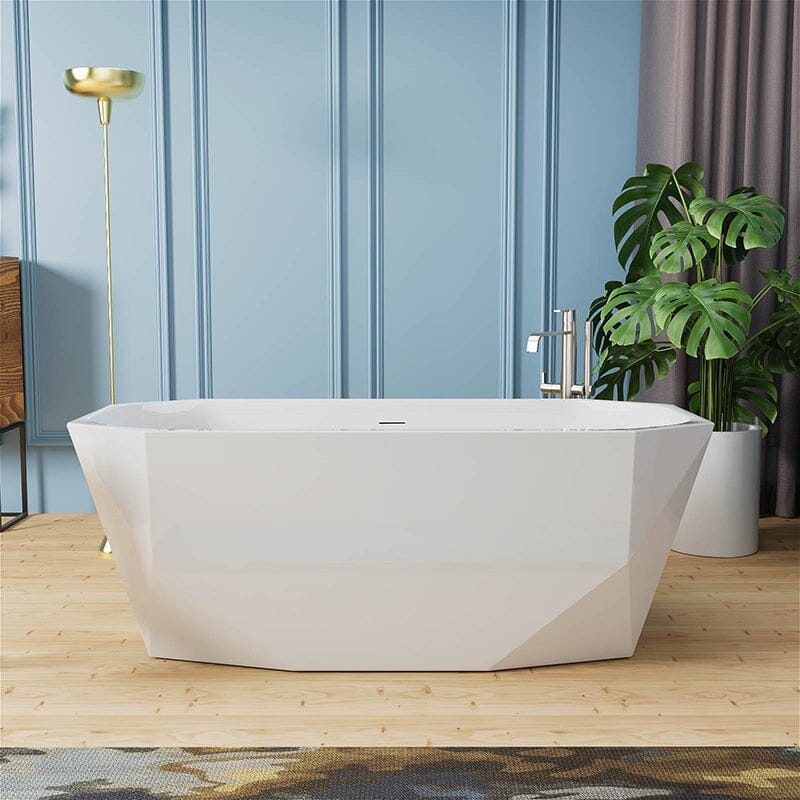
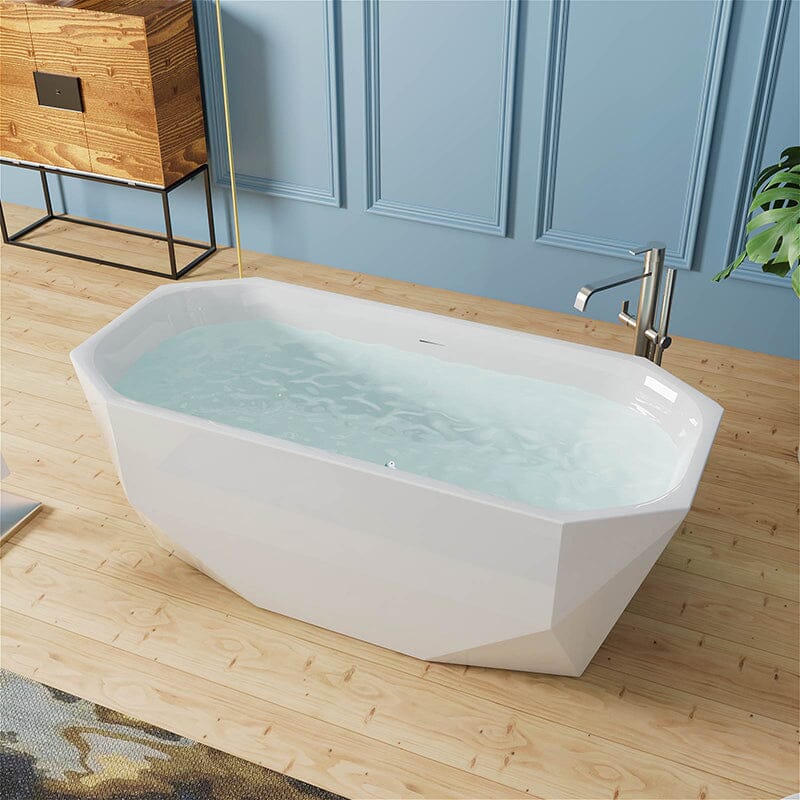 Mokleba 67'' Acrylic Tub Rectangle Freestanding Soaking Bathtub
Mokleba 67'' Acrylic Tub Rectangle Freestanding Soaking Bathtub- Regular price
-
$899.99 - Regular price
-
- Sale price
-
$899.99
Quick view
-
55" Matte White Oval Bathtub with Freestanding and Center Overflow Design

 55" Matte White Oval Bathtub with Freestanding and Center Overflow Design
55" Matte White Oval Bathtub with Freestanding and Center Overflow Design- Regular price
-
$929.99 - Regular price
-
- Sale price
-
$929.99
Quick view
-
68'' Double Slipper Acrylic Soaking Bathtub

 68'' Double Slipper Acrylic Soaking Bathtub
68'' Double Slipper Acrylic Soaking Bathtub- Regular price
-
$1,479.99 - Regular price
-
- Sale price
-
$1,479.99
Quick view

Most Durable Bathtub Material
Cast Iron
When manufacturing bathtubs with cast iron, manufacturers typically start by melting iron ore into a liquid state. The molten iron is then poured into molds to shape it. After cooling and solidifying, the molds are removed, and a layer of enamel is applied to the surface to form the final bathtub. Clearly, cast iron bathtubs are known for their durability and can last up to 50 years, often being regarded as a permanent fixture in the bathroom.
-
Pros
- With a properly functioning plumbing system, a cast iron bathtub can last at least 50 years.
- Its classic, vintage appearance is ideal for users who prefer a traditional bathroom design.
- Investing in a cast iron bathtub significantly enhances the value of a home.
-
Cons
- Some brands of cast iron bathtubs can cost over $6,000, making them quite expensive.
- Cast iron bathtubs are very heavy, which not only increases transportation costs but also requires professional installation.
- Most cast iron bathtubs are designed in a vintage style, offering fewer design options.
- Some cast iron bathtubs with claw feet may require additional floor reinforcement to prevent issues during installation.

Most Comprehensive Bathtub Material
Solid Surface
Solid surface material, also known as stone resin, is a bathtub material made by mixing crushed stone minerals with resin. Its manufacturing process is similar to that of cast iron bathtubs: molten solid surface material is poured into molds, reshaped, and then the surface is polished to achieve a smooth finish. This material has rapidly gained popularity in the bathtub industry in recent years, primarily due to its exceptional performance and reasonable price, making it an ideal choice for high-end bathroom renovations.
-
Pros
- The most comprehensive bathtub material, offering a balance of appearance, texture, and price.
- Minor scratches or yellowing can be removed by sanding the surface with sandpaper.
- Extremely reliable quality; with regular maintenance, it can last at least 15 years.
-
Cons
- It costs around $1,500, much more expensive than fiberglass and acrylic.
- Due to its solid cast structure, it is relatively heavy.
- This material is relatively new, so stores selling solid surface bathtubs are less common.
-
55" Solid Surface Stone Resin Oval-shaped Freestanding Soaking Bathtub with Overflow
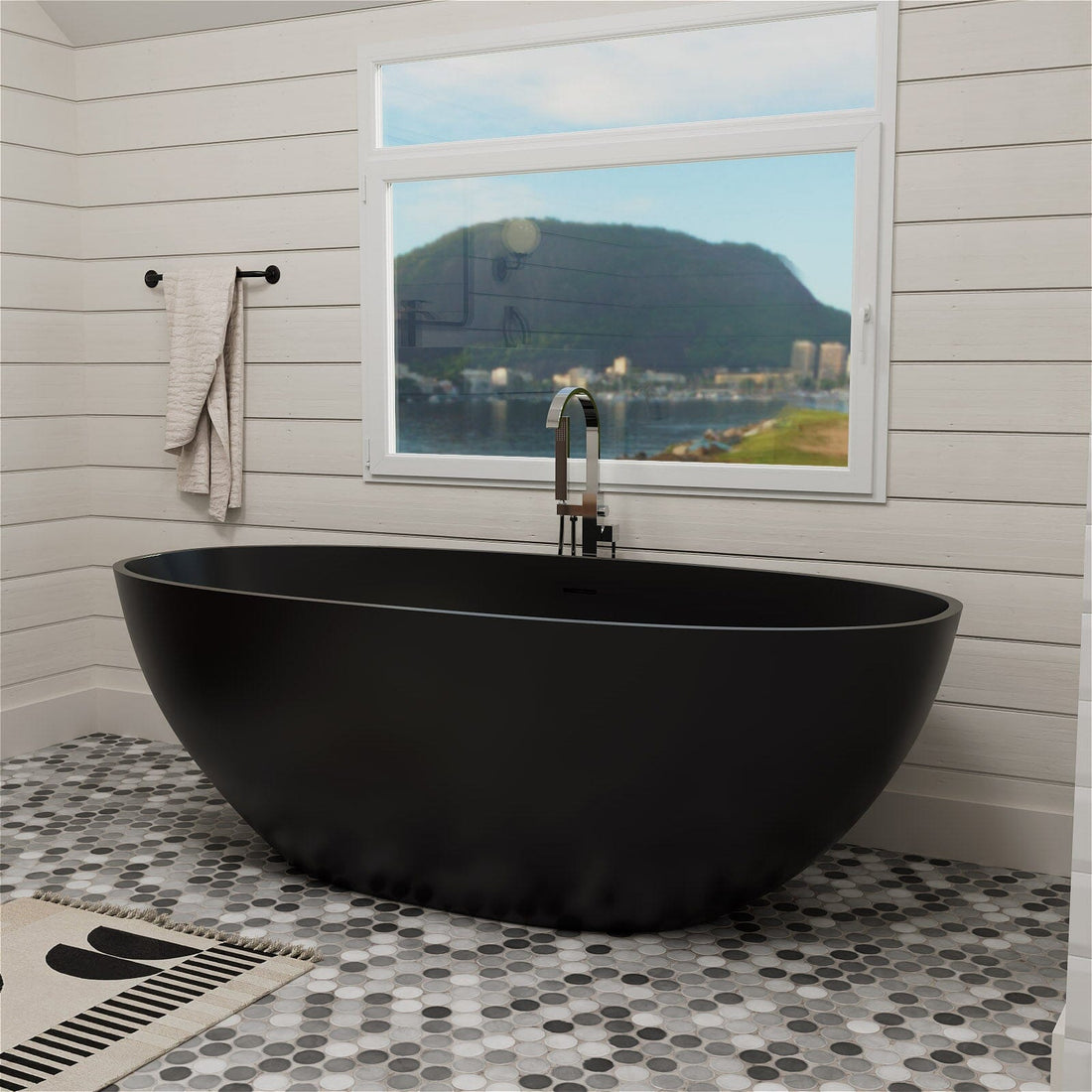
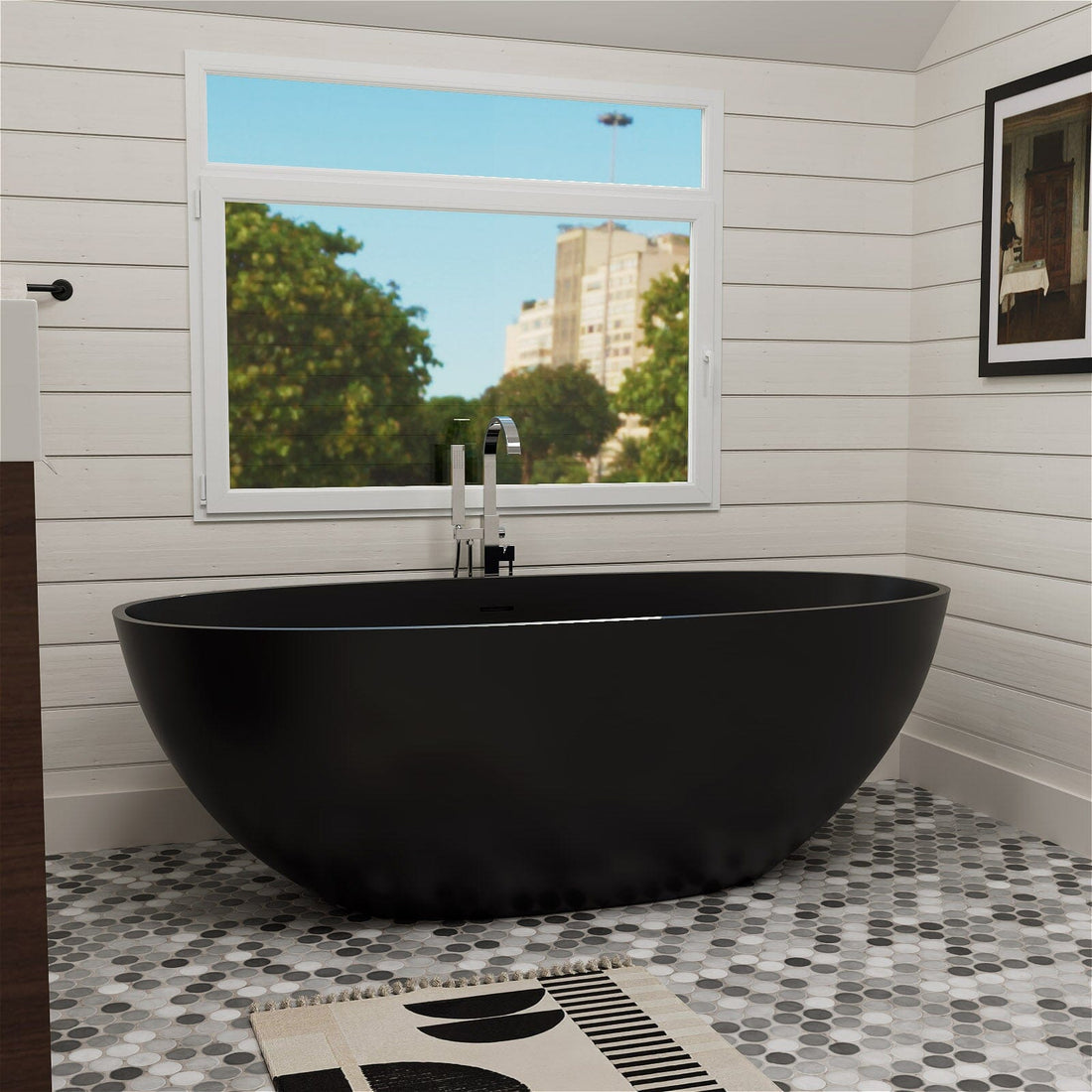 55" Solid Surface Stone Resin Oval-shaped Freestanding Soaking Bathtub with Overflow
55" Solid Surface Stone Resin Oval-shaped Freestanding Soaking Bathtub with Overflow- Regular price
-
$1,999.99 $2,199.99 - Regular price
-
$0.00 - Sale price
-
$1,999.99 $2,199.99
Quick view
-
63'' Solid Surface Stone Resin Tub Freestanding Soaking Bathtub with Towel Rack Shelf
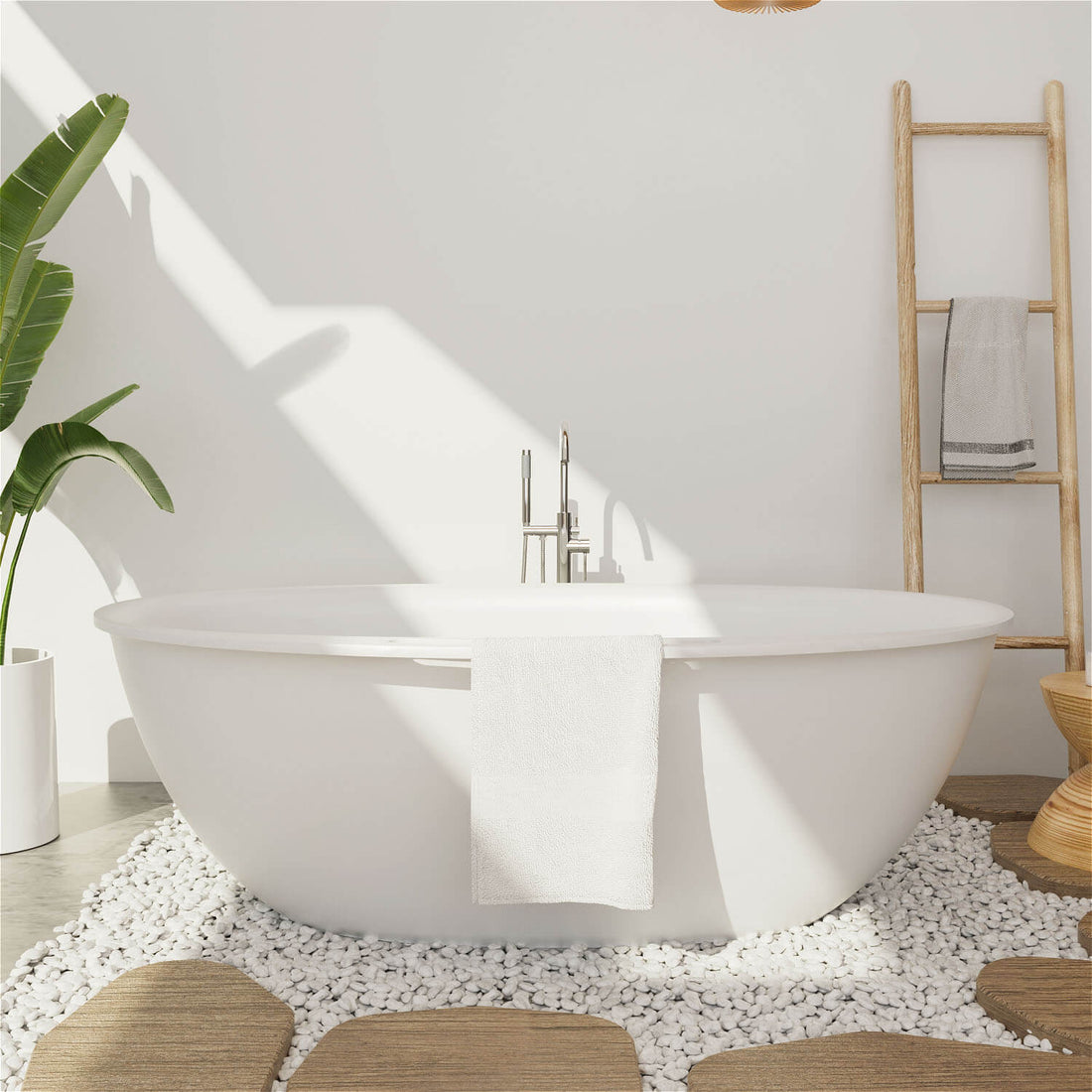
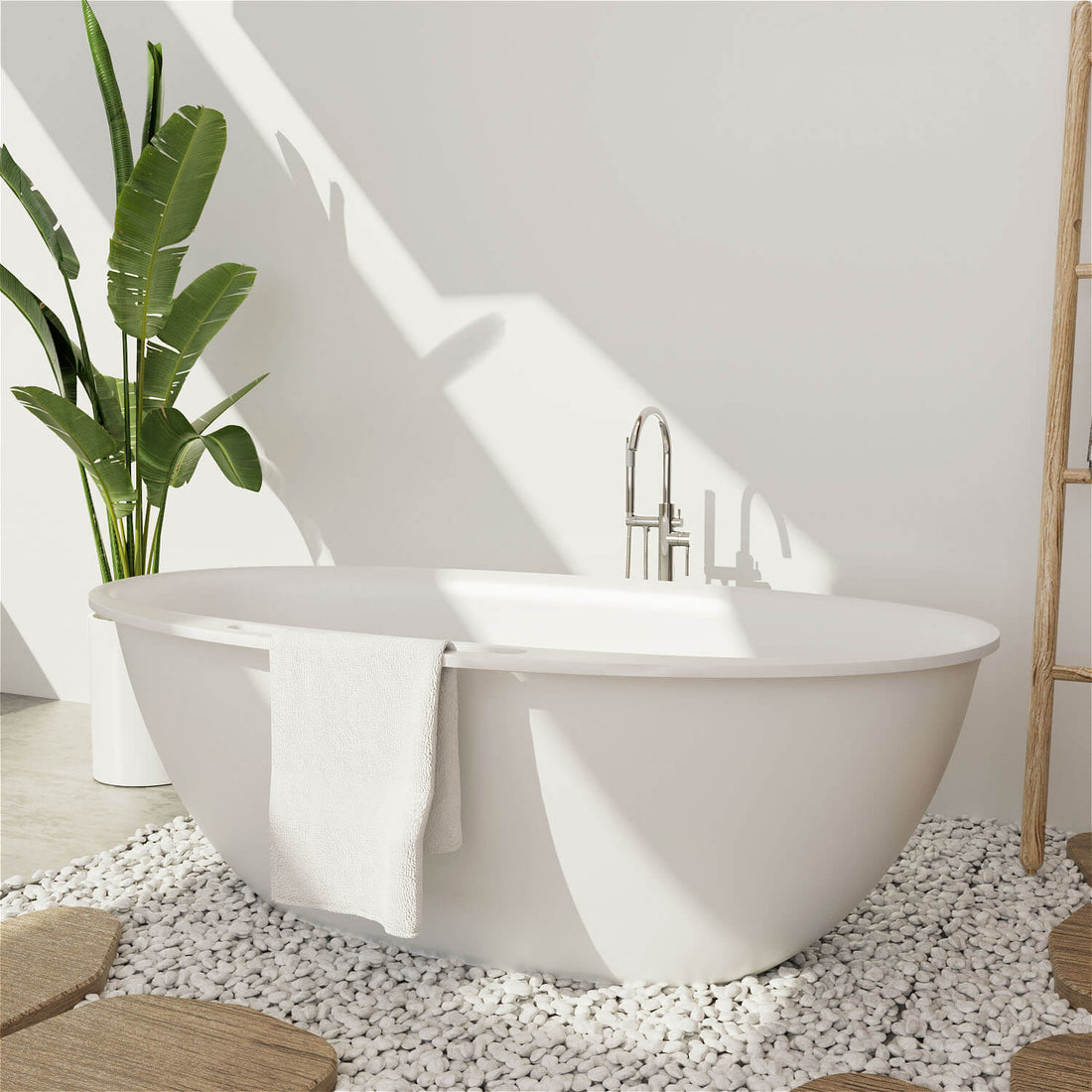 63'' Solid Surface Stone Resin Tub Freestanding Soaking Bathtub with Towel Rack Shelf
63'' Solid Surface Stone Resin Tub Freestanding Soaking Bathtub with Towel Rack Shelf- Regular price
-
$1,599.99 - Regular price
-
$2,199.99 - Sale price
-
$1,599.99
Quick view
-
67'' Solid Surface Stone Resin Modern Egg Shaped Freestanding Soaking Bathtub with Overflow
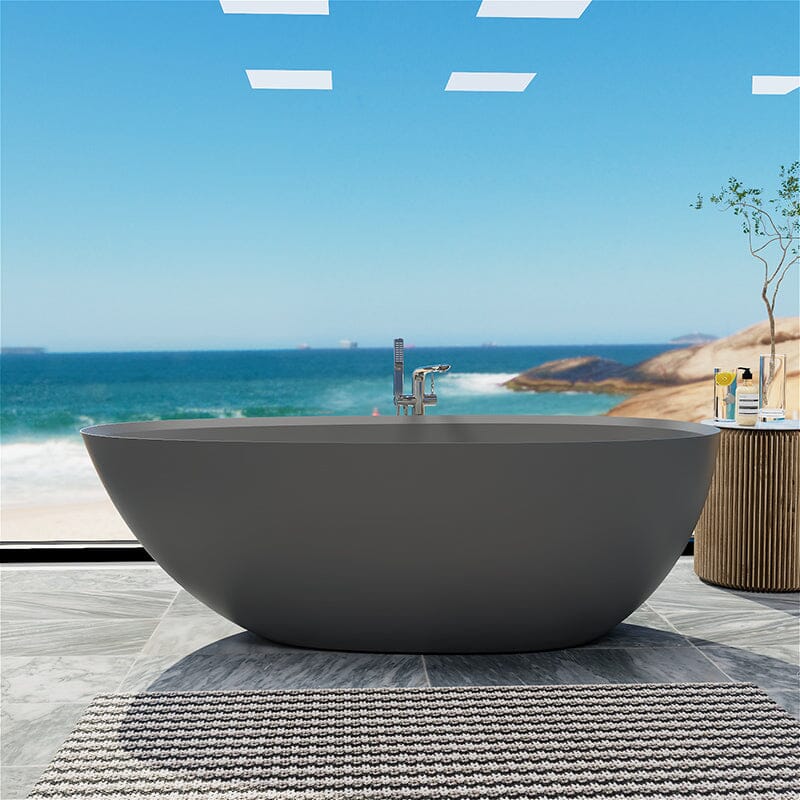
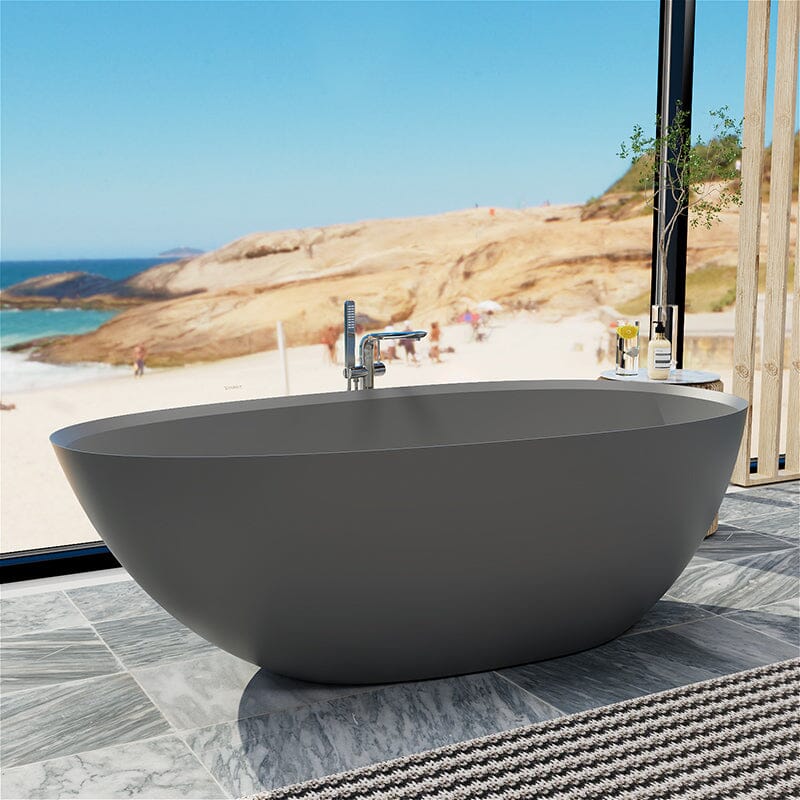 67'' Solid Surface Stone Resin Modern Egg Shaped Freestanding Soaking Bathtub with Overflow
67'' Solid Surface Stone Resin Modern Egg Shaped Freestanding Soaking Bathtub with Overflow- Regular price
-
From
$1,779.99 - Regular price
-
$2,199.99 - Sale price
-
From
$1,779.99
Quick view
-
69" Resin Oval Modern Art Transparent Freestanding Soaking Bathtub
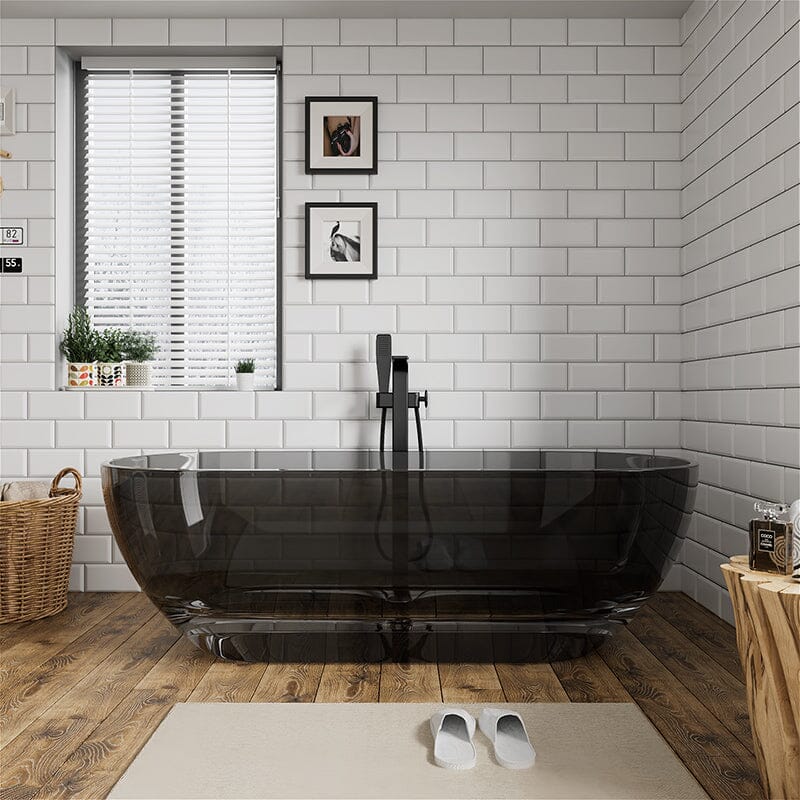
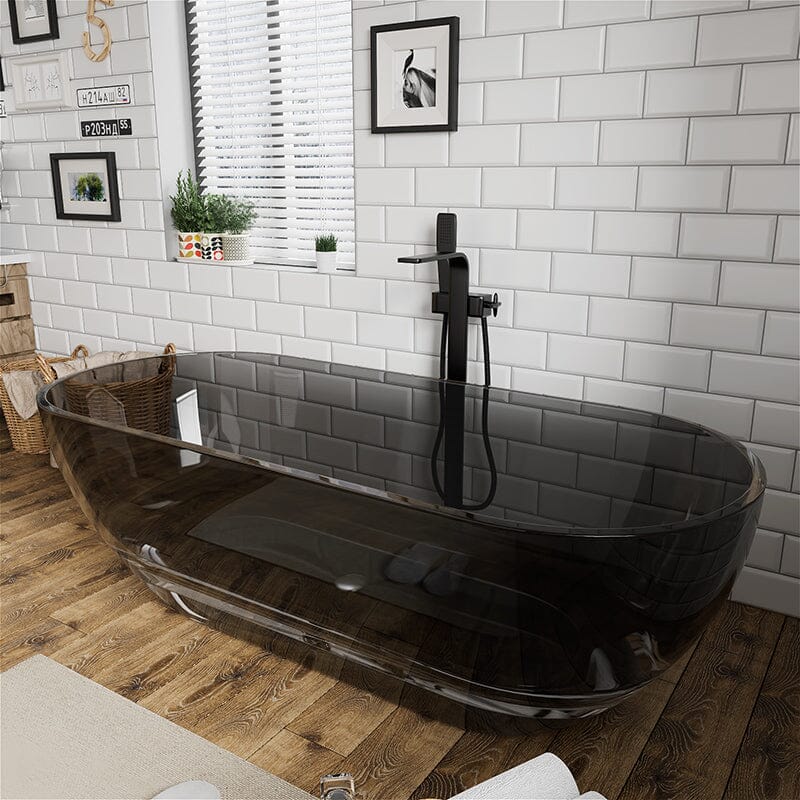 69" Resin Oval Modern Art Transparent Freestanding Soaking Bathtub
69" Resin Oval Modern Art Transparent Freestanding Soaking Bathtub- Regular price
-
From
$2,999.99 - Regular price
-
$4,999.99 - Sale price
-
From
$2,999.99
Quick view
Which is the Best Bathtub Material
Earlier, we introduced four of the most common bathtub materials and discussed their advantages and disadvantages. Clearly, when debating the "best bathtub material," it’s difficult to reach a definitive conclusion, as each material has its own unique strengths and suitable scenarios. Ultimately, the best material for you is the one that meets your specific needs and budget.
If your primary concern is budget, then fiberglass and acrylic are likely the best materials for bathtubs. Compared to other materials, fiberglass and acrylic offer the most cost-effective options. If you’re open to the price of these two and want to find something better, then acrylic is recommended, as it is about 30 times more durable than fiberglass, with a lifespan nearly twice as long. Additionally, acrylic performs better in terms of oxidation resistance. Therefore, if your budget is under $1,000, acrylic may be the best choice. If your budget is around $400, fiberglass is still a wise option.
For those who prefer a vintage bathroom design, cast iron or copper is the ideal bathtub material. Although copper was not mentioned earlier, it is, like cast iron, a classic representative of vintage style and is very durable. Bathtubs made from these two materials are usually more expensive, but the visual and tactile experience they offer is unmatched by other materials. While acrylic and solid surface materials can also be designed in vintage styles, for users seeking the ultimate in design, cast iron or copper creates a richer vintage atmosphere, especially in medieval-style bathroom designs. Cast iron bathtubs are particularly notable for their smooth enamel-coated texture, while a copper bathtub may be more appealing for bathrooms with a grid design.
If your budget is more flexible and you want to create a high-end feel in your bathroom, solid surface material is an excellent choice. Solid surface bathtubs often exude a sense of luxury rather than cheapness. For those willing to invest more and prioritize relaxation, a wooden bathtub might be the best option, as it can enhance the overall atmosphere of your bathroom and release a subtle natural fragrance, further elevating your soaking experience.
Ending
When selecting the right bathtub, the best approach is to first understand the characteristics of various bathtub materials and then make a choice based on your own needs and the properties of each material. This article has only introduced a few common types of bathtub materials. If you would like more detailed information or have any related questions, feel free to contact Giving Tree Home. While we primarily focus on product sales, we possess expert knowledge on all matters related to bathroom and kitchen furniture and are happy to share it with you!
More Ideas
-

Does Not Flushing the Toilet Really Save Money?
Think skipping toilet flushes saves money? Think again! Discover why not flushing can lead to hygiene issues, plumbing damage, and even social discomfort. Learn smarter ways to save water and...
-

Should You Close the Toilet Lid Before Flushing
Wondering if you should close the toilet lid when flushing? This article explains the science behind gravity and siphon flush toilets and offers surprising insights on how to reduce bacteria...
-

5 Creative Ideas for Gray Bathroom Tiles
Discover five creative gray bathroom tile ideas to elevate your space. From floral designs that add vibrancy to bold gray and white contrasts, these tips tackle common design challenges, offering...
-

Everything You Need to Know About Concrete Bathtubs
Discover everything you need to know about concrete bathtubs! From their durability and industrial aesthetic to the pros and cons, this guide helps you decide if this unique, customizable option...
-

What is Solid Surface Material?
Discover the versatility and elegance of solid surface materials. From sleek kitchen countertops to stylish bathroom vanities, learn how this durable, easy-to-maintain, and eco-friendly material is transforming modern design. Explore...
-

How to Remove Yellow Stains from a Bathtub
Learn how to remove yellow stains from your bathtub caused by hard water, chemicals, or aging materials. Discover natural cleaning tips and expert techniques to restore your tub’s shine and...






















